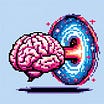
's writing draws on his background in neuroscience and philosophy to explore important topics like consciousness, free-will, and Doc Ock's robot arms in his publication, Cognitive Wonderland.
1. Why Substack?
I had things I wanted to write that didn't have another place. What venue is there for weird essays on science and philosophy? I've written short fiction and scholarly works, but the end-goal with those is always to get a publisher to take them. I wanted something more like a blog, but who reads blogs nowadays?
I liked the idea of Substack since I could have ownership over my audience and therefore more freedom, but I wasn't sure I would find anyone to read. I gave it a shot anyway, and I’m glad I did.
2. How long did it take you to find your groove?
It was surprisingly quick. All it took was me hitting the publish button on my first post.
My biggest concern when I started was that I wouldn't be able to write enough to post consistently. With two toddlers and a full-time job, it's hard to find time to write anything. I started publishing weekly because I had a couple articles pre-written to give myself a head start. I figured I would quickly run out and then publish less regularly. Instead, I got out of bed early to write every day and consistently got a new article polished for each week. I've been publishing weekly since I started in May.
3. How has it changed you?
I've never had a significant social media following or any kind of audience of this size for something I care about so much. It's empowered me to go deeper on topics I care about. The (self-imposed) pressure to publish weekly has built a stronger writing habit than I've ever had.
4. What mistakes have you made?
Titles of posts really matter. If you want people to click your article, your title needs to make them want to. I messed up early on not thinking deeply enough about titles, and later by making a somewhat click-baity title that really backfired (I ended up changing it within a day of the article being out).
5. To pay or not to pay?
I have paid subs on but I don't paywall any content. Freely available content is better marketing than gated content so my focus has been and will remain there as I'm trying to grow. In the future I might think of paid subscriber benefits, but I've made some money with things the way they are so it's not a priority.
6. What artistic and technical choices have you made
Initially, I tried writing with a sort of starry-eyed wonder, trying to channel Carl Sagan. As I wrote more, that didn't feel comfortable, and I leaned more into humor. I hope I still get across wonder as an undercurrent, but the humor has come to the front more—and it's more fun that way.
7. What’s been the effect on your writing?
Writing consistently has been great for my skills. I've become better at outlining and have a well-refined process for editing. I'm also producing more writing than I ever have previously, and it's been useful for generating ideas and raw materials for other future projects.
8. In it for the long haul?
Yes. I came to Substack not sure what I wanted, but now I feel like I have a small (but quickly growing) platform for my creative pursuits. I'm sure aspects will change over time, but I plan to stick around for a long time.
Subscribe to :






Thanks for the introduction to Tommy. I look forward to checking out his work.
Tommy's comment about the way that a self-imposed discipline of weekly essays can create a good writing habit is something I've found works for me too, as a new writer. And yes, getting the title right. That's an important point.